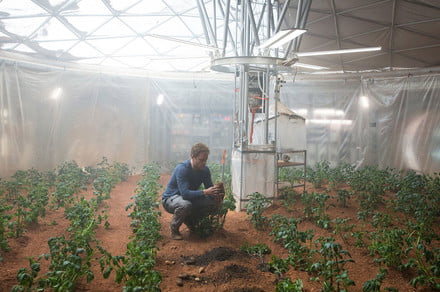An off-Earth colony seems pretty promising with the rate climate change is going. But that’s easier said than done. Building a viable colony anywhere outside of Earth’s atmosphere will pose engineering and logistical challenges unlike anything we have experienced. Not only will we need to transport those space pilgrims, but we’ll also need to shelter and feed them. That last point may pose the most difficult challenge. As Mark Watney made clear in The Martian, farming in space isn’t as easy as it is on Earth.
Now, researchers at the University of Zurich have shown how space farming may be possible. By engineering plants to excrete excess amounts of a certain hormone, they demonstrated that crops can thrive despite challenging space conditions, such as low-nutrient soil and microgravity.
“Food … production is and probably will be a big challenge in the next decades on this planet, because of increasing world population, decreasing arable land, and limited fertilizer resources,” Lorenzo Borghi, a biologist at the University of Zurich who worked on the research, told Digital Trends. “If we start colonizing other planets or employing humans in long space missions, local food … production in laboratory conditions or alien soils will be as challenging, as alien soils are very likely far poorer in nutrients compared to our agricultural lands.”
There are ways around that, Borghi pointed out, such as shipping soil and fertilizer to space. However, transport comes at a significant economic and ecological cost.
Instead, Borghi and his colleagues propose that a plant hormone may be able to boost crop production by encouraging a symbiotic relationship between plant roots and fungi in the soil. Called mycorrhiza, this relationship provides plants with more resources, such as water, nitrogen, and phosphate. The plant hormone, strigolactone, triggers this symbiotic relationship.
“We engineered plants that can exude high amounts of strigolactone to the soil and thus obtain high levels of mycorrhization,” Borghi said. “We tested these plants in microgravity and found that they can obtain high levels of mycorrhization and high biomass production even in microgravity.” That is, higher levels of the plant hormone may counteract the negative effects of microgravity and poor soil on crop propagation. “Therefore we suggest that it will be important to choose crop varieties with high strigolactone exudation for future space farming on alien soils.”
To simulate space farming conditions, Borghi and his team grew petunias — which are in the same family as tomatoes, potatoes, and eggplants — in low gravity. But before we pack astronaut backpacks full of engineered plants, the researchers will want to test their plants in real space conditions, either on a space station of an alien world.
A paper detailing the research was published this month in the journal Nature Microgravity.
Editors’ Recommendations
- Leafy greens are grown by machines at new, automated Silicon Valley farm
- Attention, space gardeners: Simulated Martian soil now on sale for $20 a kilo
- ‘Crop-dusting’ drones drop biodegradable sensors instead of pesticides
- The BrambleBee robot promises to help honeybees pollinate flowers
- 15 epic sci-fi novels you should read before they become blockbuster films

